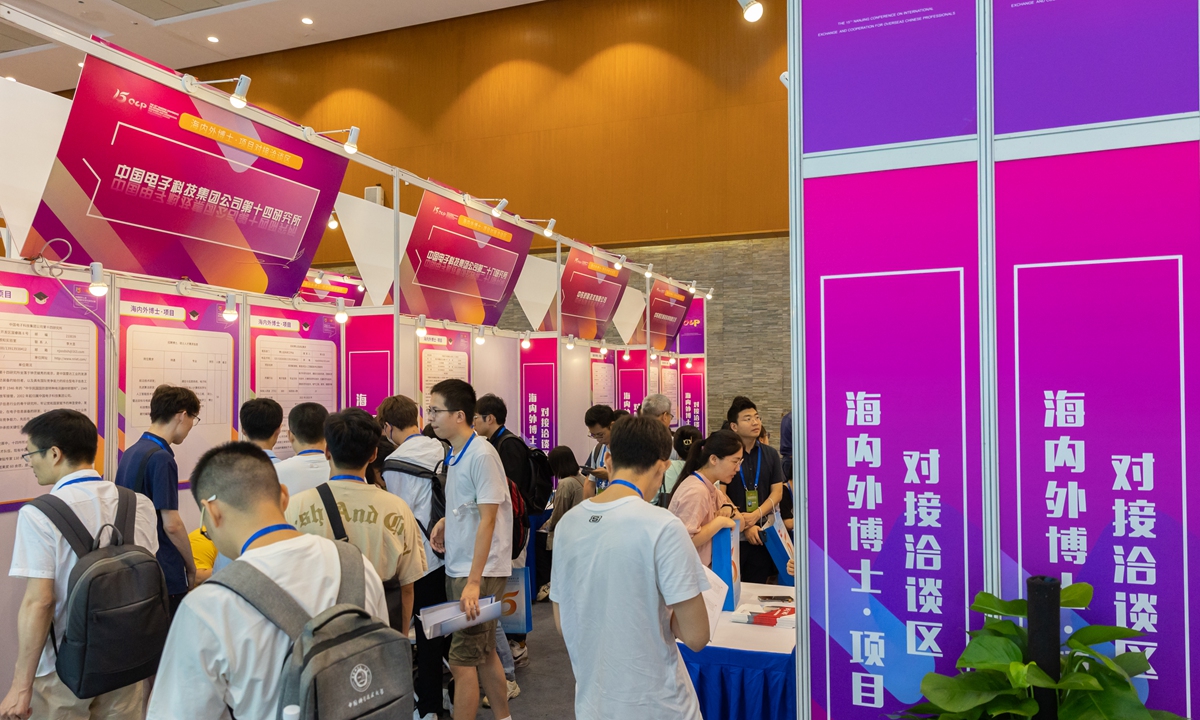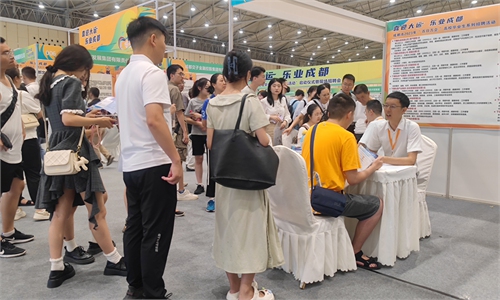
Graduates hunt jobs in a fair held in Nanjing, East China's Jiangsu Province on June 28, 2023. Photo: VCG
As the class of 2023 bid farewell to campus life, a record number of new graduates have flocked to the job market. Amid the job-hunting season which has been dubbed the toughest in history, some new employment trends emerge as more and more generation Z choose to build up careers from the "grass roots" - the vast western region, hometowns back in villages and towns, and remote areas.
As one of the Generation Z (people born between 1996 and 2010), Wei Hongyu, a 2023 graduate of Inner Mongolia Minzu University's Law School, is also standing at a crossroads of choosing a career that she can do for a living.
Instead of following a traditional path of finding a job in the law field, she chose to start her own business back in her hometown in Hulun Buir, North China's Inner Mongolia Autonomous Region, committing to the inheritance and innovative development of Ewenki ethnic group's "sunflower" intangible cultural heritage.
"Sunflower" handicrafts are made of leather, wool, beads and other materials. The colorful gems and various fur symbolize the radiance of the sun and the beautiful and harmonious life like a rainbow, representing the wishes for the people's well-being, harmony, peace, and good fortune.

Wei Hongyu, a 2023 graduate of Inner Mongolia Minzu University's Law School, showcases "sunflower" handicrafts. Photo: Courtesy of Wei Hongyu
"Giving back to hometown"
The inheritance of the "sunflower" intangible cultural heritage has been facing difficulties, such as aging of inheritors and insufficient marketing investment, leading to fewer and fewer people who know how to make the beautiful handicrafts, Wei told the Global Times on Monday.
Growing up in the grasslands, she is steeped in the local ethnic culture from an early age. "As an Ewenki myself, I want to better carry forward the local ethnic characteristics and, in the meantime, help boost income of local residents," she continued.
Based on the core characteristics of the "sunflower", Wei's group has been offering innovative designs and inviting craft masters to teach local residents to help more people master this skill and increase their incomes.
As the summer vacation begins, Wei's group has also expanded cooperation with tourism agencies and offered handicraft making experience for tourists from all over the country. "We have received visitors far from East China's Shanghai Municipality, South China's Hainan and Guangdong provinces," she explained.
After learning in a university for four years and expanding horizons, the original intention of giving back to the hometown remains, Wei said.
Talking about her career choices, Wei said her law major is an advantage for her future development, rather than a limit for employment options.
Like Wei, more and more college graduates have chosen to return to their hometowns to start their own businesses, such as agricultural products cultivation, animal husbandry with advanced technologies or using internet platforms to help promote local products.
Under the rapid development of digital technology, college graduates have gained better knowledge and skills on using internet platforms; while the advancement of internet platforms over recent years has helped lowered the threshold of starting new businesses, with lower costs and risks, Yang Weiguo, vice dean of the Beijing Academy of Social Sciences, told the Global Times.
Taking roots and blossom
Besides young entrepreneurs, there are also growing number of graduates choosing to find jobs in regions of "grass roots", such as teachers, doctors, civil servants and others.
On one hand, the graduates have been facing great job-hunting pressure; while on the other hand, governmental departments have offered improved support for grass-roots employment for graduates, Li Changan, a professor at the Academy of China Open Economy Studies of the University of International Business and Economics, told the Global Times on Monday.
China's employment has remained largely stable in the first half of 2023, with the average surveyed urban unemployment rate dropping down 0.2 percentage points from the first quarter to 5.3 percent, data from the National Bureau of Statistics (NBS) showed on Monday.
Meanwhile, the surveyed unemployment rate for young people aged between 16 and 24 in June stood at 21.3 percent, higher than last month. With the passing of graduating season, the rate is expected to drop after August, Fu Linghui, the NBS spokesperson, said at a press conference on Monday.
Against such backdrop, grassroots employment has become a key pathway for graduates and an important approach to alleviate the employment pressure, especially when there is huge demand for talent in grassroots regions, Li said.
Many of the government programs launched to promote grass-roots employment have preferential policies which could support graduates to build up a better career in the future, Li noted.
For instance, the "Go West" program has recruited more than 465,000 college graduates and postgraduates since it was first rolled out in 2003 which aimed to send university graduates to perform volunteer work in education, health, agriculture and social management sectors in the country's western regions for a period of one to three years, domestic Laodong Daily reported on July 10.
Another program which could be literally translated as "Three Supports and One Assistance" - a shortened form of education supporting, medicine supporting, agriculture supporting and poverty alleviation, has allocated a total of 469,000 college graduates.
And a cumulative total of 1.095 million college graduates have participated in the "Special Posts Plan" to teach in rural schools in the central and western regions of China.
Such programs have offered job opportunities for millions of graduates and, in the meantime, inject imputes in the development of grass-roots areas, experts said, calling for more guarantee measures to support them not only finding jobs but also building a great life in the areas.
With a heart full of passion, Wei told the Global Times that they have accumulated many ideas and designs since they first started entrepreneurial practices in college, now with the COVID-19 pandemic over, it is time to unleash their full potential.
"We are preparing to participate the China-Russia-Mongolia Economic and Trade Fair, hoping to bring our products and services to overseas markets," Wei said.


